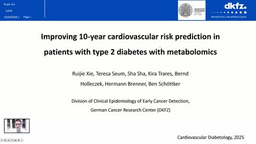Cardiovascular Diabetology awards Associate Editors of the Year 2025
Published in General & Internal Medicine


Professor Dídac Mauricio is a Full Professor of Medicine at the University of Vic & Central University of Catalonia and Director of the Department of Endocrinology & Nutrition at Hospital de la Santa Creu i Sant Pau, Barcelona. He also serves as Scientific Director of CIBERDEM, Spain’s national diabetes research consortium. He holds an MD from the University of Barcelona, a PhD from the Autonomous University of Barcelona, and has specialized in endocrinology and nutrition. His ample research focuses on diabetes management, particularly cardiovascular complications, and multicenter clinical trials with direct patient-care impact. Having an h-index of nearly 70, he has contributed almost 400 peer-reviewed and highly cited articles, many of them in the most prestigious scientific journals. He is also recognized for his leadership in multicenter clinical trials and collaborative research networks at both the national and international levels. In addition, he is past President of the Diabetes Advisory Council of Catalonia and member of several editorial boards.
Since joining Cardiovascular Diabetology in 2021 as Associate Editor, he has collaborated with our journal promptly and effectively, co-edited the ongoing collection “Cardiometabolic and hepatic interconnections: from mechanisms to clinical implications”, and has been particularly active in promoting the journal’s visibility, fostering innovations in scientific communication through video summaries and blog contributions. With this award, Cardiovascular Diabetology recognizes his scientific achievements, editorial excellence, and invaluable contributions to strengthening the journal’s position as a leading reference in the fields of cardiovascular and metabolic research.
 Francesco Paneni is Professor of Cardiology at the Medical Faculty of the University of the Zurich. He is Senior Cardiology Consultant and Head of the Cardiometabolic Division at the Department of Cardiology, Zurich University Hospital. He is also Director of the Center for Translational and Experimental Cardiology (CTEC) at the Zurich University Hospital and Group Leader of the Cardiovascular Epigenetics lab within CTEC. He earned his MD and PhD at the University of Rome “Sapienza”. During his training, he worked as research fellow at Mount Sinai Medical Centre under the supervision of Prof. Fuster. After his PhD, he trained as a post-doctoral fellow at the Institute of Cardiovascular Physiology, University of Zurich and the Center for Molecular Medicine at the Karolinska Institute. A main goal of the Paneni lab is to characterize the role of environmental stress and chromatin remodelling in cardiometabolic diseases, including atherosclerosis, microvascular dysfunction, diabetic vascular complications and heart failure with preserved ejection fraction. Prof. Paneni received several awards from the European Society of Cardiology and the American Heart Association, namely the “Circulation Research Best Manuscript Award” and the “Early Career Outstanding Investigator Award”. He is author of 205 peer-reviewed articles in esteemed journals and was invited to give keynote lectures at prestigious meetings worldwide. He is past Nucleus Member of the ESC Credential Committee and is currently Nucleus Member and Coordinator of the ESC Working Group of Cellular Biology of the Heart. Finally, he is remote reviewer for the European Research Council and panel member for the Swiss National Science Foundation and the Research Council of Finland.
Francesco Paneni is Professor of Cardiology at the Medical Faculty of the University of the Zurich. He is Senior Cardiology Consultant and Head of the Cardiometabolic Division at the Department of Cardiology, Zurich University Hospital. He is also Director of the Center for Translational and Experimental Cardiology (CTEC) at the Zurich University Hospital and Group Leader of the Cardiovascular Epigenetics lab within CTEC. He earned his MD and PhD at the University of Rome “Sapienza”. During his training, he worked as research fellow at Mount Sinai Medical Centre under the supervision of Prof. Fuster. After his PhD, he trained as a post-doctoral fellow at the Institute of Cardiovascular Physiology, University of Zurich and the Center for Molecular Medicine at the Karolinska Institute. A main goal of the Paneni lab is to characterize the role of environmental stress and chromatin remodelling in cardiometabolic diseases, including atherosclerosis, microvascular dysfunction, diabetic vascular complications and heart failure with preserved ejection fraction. Prof. Paneni received several awards from the European Society of Cardiology and the American Heart Association, namely the “Circulation Research Best Manuscript Award” and the “Early Career Outstanding Investigator Award”. He is author of 205 peer-reviewed articles in esteemed journals and was invited to give keynote lectures at prestigious meetings worldwide. He is past Nucleus Member of the ESC Credential Committee and is currently Nucleus Member and Coordinator of the ESC Working Group of Cellular Biology of the Heart. Finally, he is remote reviewer for the European Research Council and panel member for the Swiss National Science Foundation and the Research Council of Finland.
Professor Paneni joined Cardiovascular Diabetology in 2022 as Associate Editor. Since then, he has fulfilled his editorial duties with outstanding efficiency, handling numerous manuscripts and consistently making well-founded editorial decisions. Together with Dr. Era Gorica, he served as Guest Editor of the collection “Cardiometabolic HFpEF with focus on type 2 diabetes mellitus,” a successful series of 45 articles published in 2024–2025 that represents the most up-to-date perspective on this important clinical topic. Beyond his editorial responsibilities, Professor Paneni has been proactive in suggesting initiatives to expand the journal’s scope and visibility and has contributed valuable ideas that have strengthened its impact within the cardiovascular and metabolic research community.
Follow the Topic
-
Cardiovascular Diabetology

This journal considers manuscripts on all aspects of the diabetes/cardiovascular interrelationship and the metabolic syndrome; this includes clinical, genetic, experimental, pharmacological, epidemiological and molecular biology research.
Your space to connect: The Nitric oxide signalling in cardiovascular health and disease Hub
A new Communities’ space to connect, collaborate, and explore research on Cardiovascular Physiology, Clinical Medicine, and Diseases!
Continue reading announcementRelated Collections
With Collections, you can get published faster and increase your visibility.
Organoids as emerging models in diabetes and cardiovascular research
Organoids—three-dimensional structures derived from stem cells—are transforming biomedical research by modeling key aspects of human physiology and disease. By replicating native tissue architecture, cellular heterogeneity, and functional behavior, they provide human-relevant systems that address limitations inherent to conventional in-vitro and animal models.
Diabetes and cardiovascular disease are deeply interconnected conditions, characterized by shared, multi-organ pathophysiology. Organoid technologies offer unique opportunities to dissect disease mechanisms, evaluate therapeutic strategies, and develop personalized, physiologically relevant models. These systems enable the investigation of cardiometabolic processes in platforms that better reflect the complexity and progression of human disease.
Cardiovascular Diabetology welcomes original research articles, reviews, and meta-analyses for this Collection, which aims to highlight the use of organoid technologies in advancing our understanding of cardiovascular complications associated with diabetes.
Areas of interest include, but are not limited to:
- Organoid models of diabetic cardiomyopathy and heart failure
- Matrigel alternatives for organoid development
- Cell-cell and extracellular matrix interactions in organoids
- Organoid-based drug testing for cardiovascular diseases
- Organoid-on-chip systems for tissue crosstalk and perfusion3D bioprinting and tissue engineering for cardiovascular organoids
- Artificial intelligence–driven analysis of organoid function and phenotypes
- Organoid models of gestational diabetes–induced congenital heart disease
- Functional genomics using CRISPR in cardiovascular organoids
- Single-cell and spatial omics to map disease states in organoids
- Co-culture systems of vascular and pancreatic organoids to study metabolic-vascular crosstalk
- Organoid-based screening platforms for anti-diabetic and cardioprotective drugs
Submissions that contribute to conceptual clarity (e.g., distinctions between organoids and spheroids), incorporate multi-organ or metabolic system perspectives, or connect technological development with clinical or translational insights are especially welcome.
This Collection supports and amplifies research related to SDG 3, Good Health and Well-Being.
All submissions in this collection undergo the journal’s standard peer review process. Similarly, all manuscripts authored by a Guest Editor(s) will be handled by the Editor-in-Chief. As an open access publication, this journal levies an article processing fee (details here). We recognize that many key stakeholders may not have access to such resources and are committed to supporting participation in this issue wherever resources are a barrier. For more information about what support may be available, please visit OA funding and support, or email OAfundingpolicy@springernature.com or the Editor-in-Chief.
Publishing Model: Open Access
Deadline: Jul 07, 2026
Cardiometabolic and Hepatic Interconnections: From Mechanisms to Clinical Implications
Cardiometabolic and liver diseases are no longer viewed as isolated entities. Growing evidence shows that hepatic and cardiovascular dysfunctions are tightly interconnected through shared metabolic, inflammatory, hemodynamic, and hormonal pathways. This crosstalk shapes disease trajectories and opens opportunities for integrated diagnostics and therapies.
Key interconnections include:
- Insulin resistance. The liver is pivotal for glucose and lipid homeostasis. Hepatic insulin resistance drives excess glucose production and dyslipidemia, contributing to the cardiovascular–kidney–metabolic (CKM) syndrome.
- Metabolic dysfunction–associated steatotic liver disease (MASLD). Highly prevalent in obesity and metabolic syndrome, and especially common in type 2 diabetes (T2D), which bears the highest MASLD burden. Progression to steatohepatitis or fibrosis markedly increases atherosclerotic risk.
- Liver-derived factors. Hepatokines (e.g., FGF21) and extracellular vesicles influence cardiac tissue, vascular tone, and systemic metabolism, potentially amplifying inflammation, oxidative stress, and lipotoxicity across organs.
- Systemic inflammation and lipotoxicity. Visceral adipose tissue and the liver release inflammatory cytokines and triglyceride-rich lipids, promoting endothelial dysfunction and perpetuating metabolic disturbances.
- Dyslipidemia. Elevated triglycerides and LDL, with reduced HDL, accelerate atherogenesis and cardiovascular risk.
- Hemodynamic and metabolic stress. Heart failure can cause hepatic congestion and hypoperfusion, while advanced liver disease can precipitate cirrhotic cardiomyopathy and arrhythmias, even in the absence of prior heart failure.
In summary, hepatic and cardiometabolic systems are functionally and pathologically intertwined: liver dysfunction worsens cardiovascular and metabolic health, and cardiometabolic disturbances accelerate hepatic pathology.
This Collection welcomes original research articles, reviews, and meta-analyses focused on this reciprocal relationship. Given the high prevalence of MASLD in T2D, we especially encourage submissions at the T2D–MASLD–cardiovascular interface. Addressing hepatic and cardiometabolic health in parallel is essential for effective risk reduction and patient care.
This Collection supports and amplifies research related to SDG 3, Good Health and Well-Being.
All submissions in this Collection undergo the journal’s standard peer review process. Similarly, all manuscripts authored by a Guest Editor(s) will be handled by the Editor-in-Chief. As an open access publication, this journal levies an article processing fee (details here). We recognize that many key stakeholders may not have access to such resources and are committed to supporting participation in this issue wherever resources are a barrier. For more information about what support may be available, please visit OA funding and support, or email OAfundingpolicy@springernature.com or the Editor-in-Chief.
Publishing Model: Open Access
Deadline: Jul 15, 2026




Please sign in or register for FREE
If you are a registered user on Research Communities by Springer Nature, please sign in